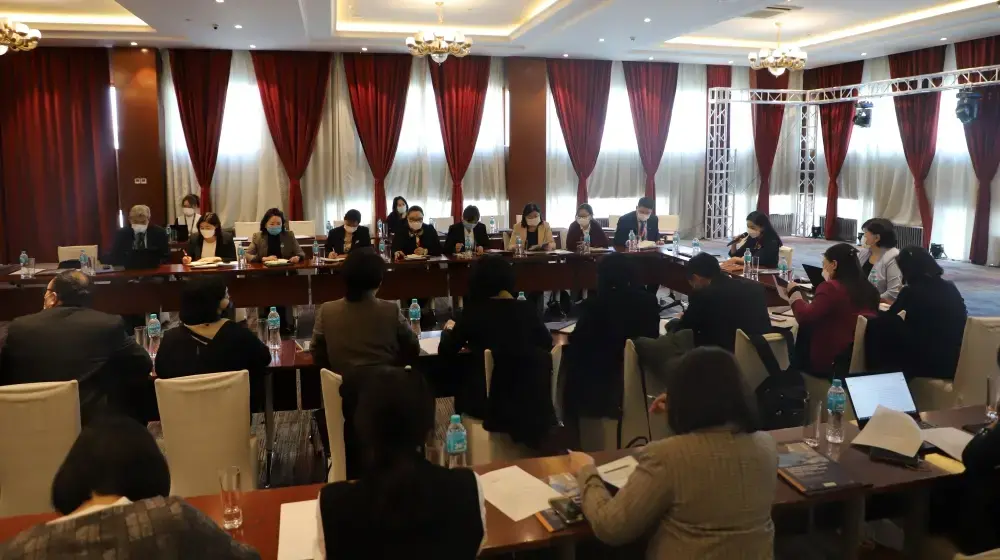Date: February 8, 2018 Venue: Parliament house
Excellency Minister of Health and MP, Ms. Sarangerel,
Health Managers from Ulaanbaatar and Aimags,
I would like to thank the Ministry of Health for inviting me to this annual health manager’s meeting. I am very inspired to be with all of you today.
And I would like to sincerely congratulate the Government of Mongolia for bringing back the Maternal Mortality Ratio in 2017 to the 2015 level of 27 per 100,000 live births, following an alarming jump from 48.6 per 100,000 live births in 2016. It is the result of strong leadership by the MOH, Ulaanbaatar and aimag health departments, the National Center for Maternal and Child Health, maternity wards, district health centers and hospitals. It clearly demonstrates the great commitment of the Government towards improving the status of maternal, newborn, child and adolescent health in the country. Congratulations!
In addition, as 2017 achievement, I would like to congratulate once again, the National Center for Maternal and Child Health for receiving the UN Public Service Award 2017 for the category of Excellency and Innovation in public service delivery. It came about through the implementation of the Telemedicine Project for Maternal and Newborn Health, which significantly contributed to achieving the MDG 5 target. And UNFPA along with the Government of Luxembourg are very proud to have been part of this process. Congratulations!
The Sustainable Development Vision of Mongolia foresees the reduction of maternal mortality ratio to 15 per 100,000 live births, noting that the maternal mortality ratio last year was 27. It means more efforts have to be made to improve maternal health. And I would like to emphasize that the sudden increase in maternal mortality in 2016 calls for special attention to address the fragility of the health system so as to avoid the reversal of developmental gains that Mongolia has achieved in the past decades.
To reduce maternal mortality further, carefully planned strategies and investments would be a key, and central to this is family planning. If vaccination helps avoid children from dying, family planning helps avoid women from dying. Family planning is a vaccination for maternal deaths. Also, family planning is part of internationally recognized human rights. In May 18th this year, the world will be celebrating the 50th Anniversary of the 1968 Proclamation of Teheran, where reproductive rights including family planning were globally recognized as inherent part of human rights as delineated in the Universal Declaration of Human Rights.
However, according to the Social Indicators Sample Survey, women’s need for family planning is not fully met in Mongolia. The unmet need for family planning in fact increased from 4 to 16% between 2003 and 2013. The Multiple Indicators Cluster Survey conducted in 2016 in Khuvsgul aimag and Nalaikh district of Ulaanbaatar also shows the increase of unmet need for family planning by 7-10%. For instance, women’s need for family planning is not met for 30% of women living in Nalaikh district. Throughout the country, severe shortages and stock-outs of modern contraceptives are confirmed through the contraceptives availability study supported by UNFPA in 2015, as well as qualitative analysis and monitoring missions. Outpatient clinics are overloaded with pregnant mothers, and the quality of reproductive health services seems to have been compromised.
At the moment, the government has allocated around 150 million tugrugs each year for the procurement of modern contraceptives. UNFPA fully recognizes the sincere efforts of the Government in the midst of economic difficulties, and this is indeed very commendable. However, it also has to be pointed out that the current level of the state budget allocation for modern contraceptives is not sufficient enough to satisfy the demand for family planning of the Mongolia’s population, especially given the increasing population size at reproductive age.
One may think that it is not possible to increase the state budget allocation, given competing demands of the country across different sectors. Yes, I agree that we need a budget to address air pollution. Yes, we need a budget to improve the quality of education. Yes, we need a budget to ensure energy supply given Mongolia’s climatic conditions. But let’s consider this from UNFPA’s latest budget analysis: every $1 dollar we spend from Mongolia’s state budget on contraceptives can reduce the cost of providing pregnancy- related care by $3.2. Therefore, it does not make sense that the country ends up spending from the state budget more money, in a reactive way, to provide care for pregnancy complications and abortion, rather than spending money in preventive and most cost-efficient way for family planning to avoid pregnancy complications, unwanted pregnancies, and abortion. If we get the investment right, we will save millions of dollars for direct health care costs. So, why don’t we look at the efficiency of the state budget allocation, so that we maximize the level of return on investment (ROI) in the health sector?
UNFPA will continue to work very closely with the Ministry of Health and health practitioners to achieve zero maternal death and zero unmet need for family planning. We look forward to 2018 achievements, and together we can make sure that the quality of maternal and newborn care services can be significantly improved in Mongolia.
Health Sector Annual Meeting_En.pdf
Health Sector Annual Meeting_Mn.pdf
Thank you!




